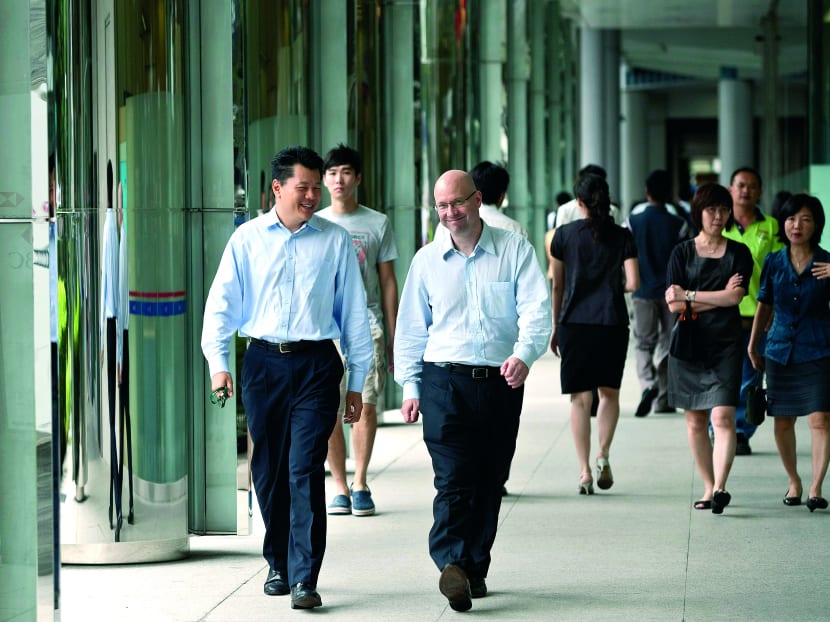Fewer skilled jobs set to be created as EDB eyes sustainable growth
SINGAPORE — Fewer skilled jobs are expected to be created in Singapore this year, with the Economic Development Board (EDB) adopting a more selective approach to investment to ensure more sustainable growth against the backdrop of a tightening labour force and other domestic constraints.

The latest job vacancies report released by the MOM showed a high number of unfilled openings. Photo: Bloomberg
SINGAPORE — Fewer skilled jobs are expected to be created in Singapore this year, with the Economic Development Board (EDB) adopting a more selective approach to investment to ensure more sustainable growth against the backdrop of a tightening labour force and other domestic constraints.
The EDB said yesterday that based on its forecast, between 14,000 and 16,000 skilled jobs will be created this year, down from the 21,400 that were added last year. In 2012, 18,600 skilled jobs were created.
There is likely be a decline in Fixed Asset Investments this year to between S$10 billion and S$12 billion, compared with S$12.1 billion last year. The Value Add forecast is also lower at between S$11.5 billion and S$13.5 billion, down from S$16.7 billion last year.
But the expected lower numbers do not mean Singapore is losing its lustre for foreign companies, EDB Chairman Leo Yip stressed.
“The mix of projects we bring in and the value they generate differ every year … The interest to build a presence in Singapore and tap growth in Asia — that has remained strong,” said Mr Yip, who was speaking at a review of the agency’s performance last year.
Economists whom TODAY spoke to said that the decline in the number of skilled jobs to be created was expected. CIMB economist Song Seng Wun described it as “the new reality that Singapore is facing”.
“Unless we perform a U-turn on our labour and population policies, our only choice to have sustainable growth is to move up to higher-value-added and less-manpower-reliant activities,” he said.
Barclays economist Joey Chew reiterated that the decline in the number of skilled jobs is a “by-product” of Singaporeans’ desire to slow down the pace of population growth.
“There’s no other way. The good thing is that we may have higher-wage jobs as the economy becomes more productive,” she said.
Citing the latest job vacancies report released by the Manpower Ministry on Monday — which showed a high number of unfilled openings — Mr Song said that the situation will not be at the expense of Singaporeans, as there will be enough skilled jobs to go around.
“Bear in mind that there are already more skilled jobs than can be filled by locals, even if fewer are created,” he said. “The extra jobs will just go to foreigners anyway. But now that we’re capping foreign labour, it makes sense that we can’t create as many jobs as we used to.”
Mr Yip reiterated that there will be a steady level of investments this year “that will keep pace with Singapore’s manpower growth rates and land planning considerations”.
“The growth that we seek going forward will have to come from high-value-added and productivity-driven activities,” Mr Yip said.
Last year, several global companies bolstered their presence here, with ExxonMobil expanding its chemical plant, while in the biomedical industry, Amgen of the United States chose the Republic to build its first plant in Asia. The EDB has also brought in companies to nurture growth opportunities in new, high-potential fields such as analytics and e-commerce.
One of these companies is Japan’s Rakuten, the world’s third-largest e-commerce operator, which has set up its main Asian headquarters here outside Japan.
Rakuten’s Vice-Chief Marketing Officer, Mr Shin Hasegawa, said the company had also set up its first consumer behaviour laboratory here last year to analyse regional consumer data. “We appreciate the economic and political stability here, as well as EDB’s strong collaboration with us. Having an open access to international and local talent pool is also a draw for us,” he said.
But some companies are finding Singapore too costly to operate in and have closed down facilities. In the chemical industry, Japan’s Ishihara Sangyo Kaisha shut its Singapore plant in August last year, shedding some 200 jobs.
Mr Yip said: “There are some challenges, no doubt. One of them is the high utility costs, and we’re working with companies to put in place energy efficiency technologies, for instance. By and large, the closures reflect very company-specific reasons ... we continue to have (a) steady flow of investments into our chemical industry.”





